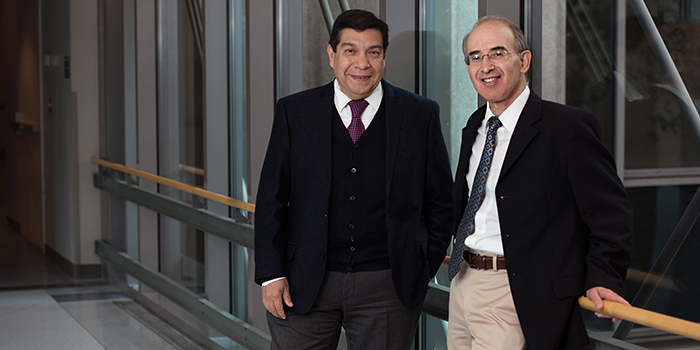Our Chiefs
Pedro Del Nido, MD, (left) is chief of Cardiac Surgery and Tal Geva, MD, is cardiologist-in-chief. For a closer look at the clinicians within our Benderson Family Heart Center, view each team by program and services.

Our Care Team
There are many specialists who assist patients and families during a hospitalization at Boston Children’s Hospital. On our Benderson Family Heart Center team, we have medical experts and other professionals to help with your family’s well-being and peace of mind.
Cardiologists
Cardiologists diagnose and manage heart disease. Many specialize in one aspect of heart care, such as catheterization or echocardiography. Boston Children’s has 72 cardiologists on staff. You will have a primary cardiologist, but other cardiologists may also be involved in different parts of your treatment plan.
Learn more about our Cardiologists
Cardiac surgeons
Cardiac surgeons perform operations to treat heart conditions. We have seven heart surgeons on staff at Boston Children’s, making ours one of the world’s largest specialized cardiac surgery programs. We also have a long history in the field: The first operation to correct a pediatric congenital heart defect took place at Boston Children’s back in 1938.
Learn more about our Cardiac Surgeons
Cardiovascular nurses
More than 300 specialized cardiovascular nurses work here at Boston Children’s. They assess each patient’s condition and provide direct care, as well as emotional support, information, education, and care coordination. A nurse will be responsible for your care at all times.
Anesthesiologists
Our anesthesiologists have special training in the use of anesthesia for cardiac procedures in patients of all ages. Here at Boston Children’s, we use a wide range of anesthesia techniques during surgery — from light sedation to general anesthesia — to meet the special needs of each patient.
Learn more about our Anesthesiologists
Perfusionists
Perfusionists are members of the Cardiac Operating Room team. They set up, monitor, and control the heart-lung bypass machine, which is used whenever it’s necessary to support or temporarily “step in for” a patient’s heart or lungs. When a patient is on the machine, the perfusionist controls their blood pressure, temperature, and other vital signs under the direction of the team physicians.
